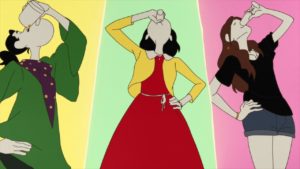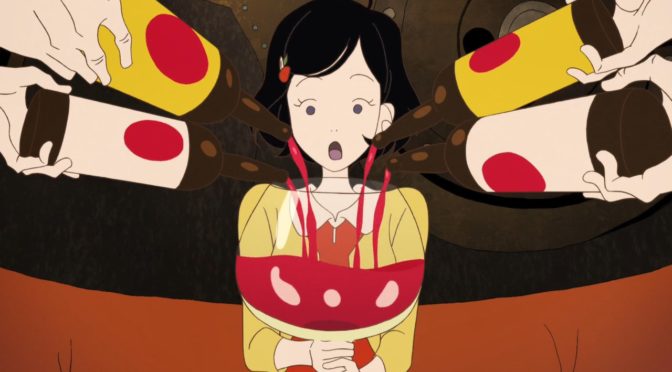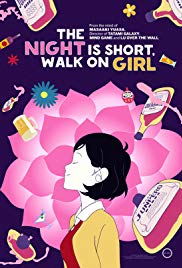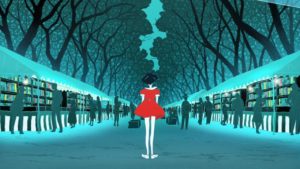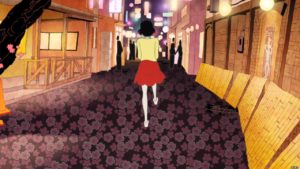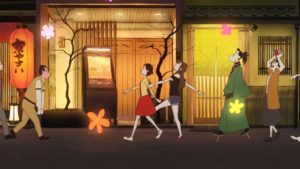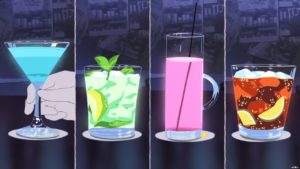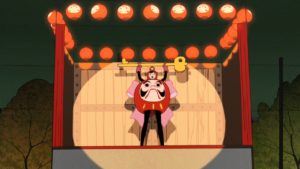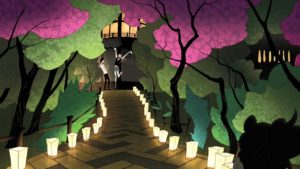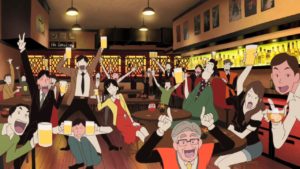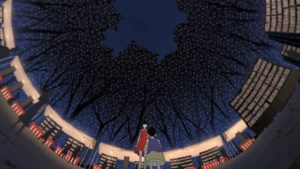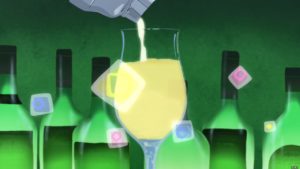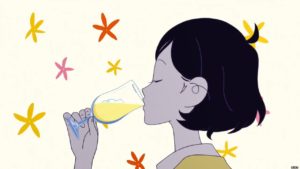Masaaki Yuasa’s animated film The Night Is Short, Walk On Girl has a pretty comprehensible basic structure to anchor it. In the tradition of films like American Graffiti and Dazed and Confused, it gives us some central characters and sets them off on a wild, freewheeling journey over the course of a single night’s revelry. It’s important to have that basic anchor of a familiar plot. Quite important in this case, because The Night Is Short, Walk On Girl is so set on chasing the unfamiliar and disorienting. No 2018 film goes on more strange, dizzying and occasionally downright bewildering flights of fancy than Yuasa’s superb anime odyssey. Plenty of films have covered one crazy night of jovial intoxication, but I have to say that most of them seem like sober teetotalers next to this. Night Is Short is a film that gets utterly drunk, on itself and on the boundless possibilities of the animated medium. And having that reassuring American Graffiti center to orbit around gives it the freedom to get completely smashed out of its gourd. It’s rather the same principle as a really great pop song. All you have to do is give the viewer or listener something to ground them just a bit (a nice hooky melody, let’s say) and then you have the liberty to go totally bonkers without losing your audience. Yuasa’s shimmering, splashy, hiccuping mirage of a night out film features multiple demigods, musical interludes, various musings on fate and chance, and an insane climax in which the different parts of a smitten young man’s id and ego are divided into hundreds of bickering delegates in some kind of crazed subconscious United Nations. Like a good night of partying, not every crazy interaction has to make sense. It’s about letting a phantasmagoria of wild experience wash over us. To be clear, there is a kind of logic at work in The Night Is Short, Walk On Girl, but Yuasa asks us to frequently abandon that logic. It will be right there where we left it. But it’s important to lose our heads to confusion, tangent and whimsy. This is a film about being young, romantic, and drunk, so it’s best not to cling to our rational senses too tightly. We can be sensible later. We can take stock of what we actually saw, heard and said during the next day’s hangover. Then we can shake our throbbing heads, laugh wincingly, and say, “Well, it all made sense last night.”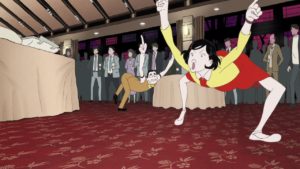
The Night Is Short, Walk On Girl is an ensemble comedy, but it is chiefly the story of a young college girl in the city of Kyoto, Japan. She is nameless for the entirety of the film, though she is sometimes referred to as Otome (Japanese for “maiden”) and sometimes as Kohai (meaning “Junior”, likely referring to her university year). She is with peers at a classmate’s wedding and is eager to embark on her first real night of adult drinking. The wedding is fun and all, but she is chomping at the bit to get out into the streets of town. To take in the colorful, lamp-lit streets of Kyoto and imbibe her way around the place. In voiceover, she expresses a longing to drink her own way. The film’s other major character is a nameless young man referred to as Senpei (Japanese for “Senior”), who pines for his younger classmate. He has gotten into the habit of repeatedly happening intentionally into her orbit, in the hopes of creating the illusion that fate is drawing them together. Aside from being not a little creepy, the major shortcoming in his plan is that he still hasn’t mustered up the courage to have a sustained conversation with her. Night Is Short is about two characters on a long night’s journey, each with their own distinct objectives: one to drink the world (figuratively and maybe literally too) and the other to finally get the attention of his crush. Aside from any single thing that happens (and, good Lord, a lot of ludicrous things do happen), Night Is Short is a feverish kaleidoscope of an alcoholic odyssey. It is one of the most jazzy, giddy, intoxicating and frequently hallucinatory depictions of a night on the town I’ve ever seen. The film starts as a pub crawl through Kyoto with an ever-growing number of strange, colorful supporting characters. That includes a man and woman in their late twenties who are blown away by Kohai’s formidable drinking abilities and take her under their wing for the night. There is also a lecherous art dealer, a new bride and her passed out new husband, a group of pontificating blowhards who refer to themselves as the Sophist Club, a cross-dressing university festival director, and a muscular man who superstitiously refuses to change his underwear until he can find the woman with whom he had a meet-cute one year prior. A couple of beings in the film aren’t even human. One is a rich, miserly, and mystical old collector who Kohai challenges to a drinking contest. Another is the childlike God of Used Books, who the characters meet at a beautifully luminous outdoor used book fair. There, Senpei hopes to find the perfect gift to tip the scales of love: a rare illustrated book that Kohai cherished in her childhood. Night Is Short depicts a night of chance encounters, a drinking contest and a spicy food eating contest, spirited discussions, and copious amounts of alcohol. I never knew that old festive ritual, the pub crawl, needed its own blissfully inventive tribute movie, but I am mighty glad to find that it exists.
Films have a magical ability to bring us back to places we have not been to in many years, or maybe been to at all. i have never been to Kyoto (and certainly not the ecstatically woozy Kyoto that exists in this film) but I have been to my early twenties. I was there for a number of years and Night Is Short transported me back to that time on a geyser of vodka tonics, rum punch and wine. I remember the anticipation and excitement of setting out into a world that now feels like yours to command; to suddenly be able to write your own adventure without any headmaster looking over your shoulder. Kohai breathlessly intones that she is ready to drink her own way. This night of excess and delirious abandon is Kohai’s maiden adult voyage and Night Is Short makes the boundless potential of that stage feel contagious, irresistible and delicious. A sweet sea breeze of limitless, youthful freedom whistles through every frame. It’s an effervescent ode to the thrill of getting to be your own person. To making your own ridiculous, misguided, gluttonous decisions. 2018 had some tremendous stories about young people coming of age, but none as bracingly impressionistic as this. Night Is Short is a symphony of excited conversation, music, glowing lights and clinking glasses, as if Yuasa figured out how to distill youth’s essence and mix it into the perfect cocktail. Kohai has her first drink of the night and marches out into what she calls “the dazzling adult world”. The film remembers the elated rush of seeing that dazzling world for the first time, and it sees it all in lush colors and elegant compositions. It is a weird, dizzying film, but also one with an invigorating love for being young, dumb and uninhibited. Even the absurdly cyclical debates of the Sophists are treated with affection. Anyone who’s been out drinking with a group surely knows that the empty, blathering drunken debate is one of life’s many pleasures. Growing up means getting to try new drinks and new ideas. We’ll learn what we like the further into adulthood we travel, but there is something so delightfully pure about that period where nothing has been determined. Moral relativism and Long Island Iced Teas probably aren’t very good for you, but there’s a time in life when it’s good to try everything out.
Night Is Short, Walk On Girl is also just a bewitching, sparkling salute to the sensory joys of a night out, whatever age you may be. Yuasa taps into Kohai’s unflagging optimism and enthusiasm as an antidote to the apathy that overtakes too many of us. The film knows most of us are not twenty anymore, but it posits that we don’t need to be to return to its joyous essence. With some of the most beautiful, effervescent and surreal imagery of the year, it reminds us the adventure of socialization waits out there for all of us. I am admittedly something of a homebody at this stage of my life. While not yet a shut-in by any means, I do often prefer the simple, inexpensive pleasure of a cold beer and a great film in the comforting confines of my own living room to a night out in public. But the beautiful lines and bright colors of Night Is Short made me want to leap from my couch and head out to the bright lights of the nearest city (Oakland in my case). Kohai says she wishes the Pacific Ocean were made of rum so she could drink from it. This film made me feel a similar kind of heedless, ineffable, nonsensical appetite. A thirst for a world of new flavors, aromas, sights, and sounds. The movie made me feel like I wanted to taste everything, see everything, listen to every piece of music and meet everyone. “Everybody get ready!,” Yuasa’s animated gem cries with some kind of fancy bellini in its hand. “We’re going for a night on the town!” The film knows that humans are social creatures who can sometimes forget they are meant to be social. We can forget how connected we are. Getting out of our houses and our own self-conscious heads isn’t always easy. But that’s what the drinks are for, as well as for tasting. With a joyful attitude and enough alcohol, we can all remember that none of us are alone. The great virtue of the pub crawl is that it calls for us to all leave our houses and go stumbling along together.
Night Is Short, Walk On Girl is an eminently thoughtful film, but I don’t want to place undue emphasis on its ideas, when it is, first and foremost, a film about pure, blissful, saturating sensation. Describing it too much in intellectual or thematic terms would feel like trying to convert Singin’ In the Rain into novelized form. Maybe it can be done, but you’d be missing the real essence of the thing. To paraphrase the producer character from that sensory masterpiece, some things you really need to see in pictures. Night Is Short is a deluge of color and sound that transcends words. Kohai dreams of being swept away in the luminous glow and abundant libations of the big city, of being awash in the pure, inebriating here and now of adulthood. The goal is not to describe the ocean of rum, but to take a long, refreshing dip in it. Yuasa has made a film of giddy immediacy. It’s a thing to be appreciated just for how it looks and feels. Kohai loves picking out cocktails because each one is its own specific, boozy bauble, with its own distinct look and taste. She tells us that each one is like its own jewel. I think films like this are the same way. Beyond their logic and their messages is the wordless pleasure of seeing and tasting something unique and beautiful. Night Is Short is a kaleidoscope of splashy colors and sprightly visual wit. At times, it feel like a jazzy Jacques Tati film seen through a hallucinatory anime prism. It’s strange, vibrant, vivid, and sweet. A bubbly cocktail for the senses and one whose most bizarre qualities only make it that much more fun to gawk at and drink from. What really is Night Is Short, Walk On Girl? I don’t know that I can tell you exactly. It’s a film. An energetic, odd little cinematic concoction shaken together by a master mixologist and designed to make you feel buzzy, silly and loose. It’s there to be sipped and savored. I can’t say much more than that. You’ll just have to taste it and see what it does for you.
Obviously it was very much to my taste. It’s a film that I find to be every kind of refreshing and delicious. The kind of film where I encourage an extra viewing just for your senses alone. There is also a small part me that wonders if it’s almost too delightfully sinful. What I mean by that is I really can’t think of a recent film, maybe any film, that makes alcohol look this flagrantly pretty and enticing. To be fair, the film makes a great many things look beautiful and delectable, from food to art to used books of all things. It’s a film with an insatiable appetite for all of life’s pleasures. Still, I’m not even going to posit the question of whether Night Is Short, Walk On Girl glorifies alcohol. It absolutely does. It doesn’t make binge drinking seem kind of appealing. It’s a veritable Sistine Chapel ceiling dedicated to the art of putting it away. Even when the film becomes about things outside of imbibing like a champion, it always feels totally plastered. It’s a full-tilt Pentecostal revival for the born-again alcoholic in your soul. Night Is Short, Walk On Girl is not a film that is out to criticize intoxication, thoughtfully contextualize it or portray it with even a modicum of restraint. It’s much too in love with every delicious thing under the Sun for such prim restraint. Beneath its clean lines and adorable lead protagonist and jaunty score beats an unapologetically hedonistic heart. And the most sinful thing about it all is how innocent it makes that hedonism feel. It makes wanton inebriation seem like the most wonderful, fundamentally decent expression of inner self. It baptizes us in Midori and sparkling wine as if a long night of boozing is the one thing left that can save our sober souls. I’m not saying the film’s view of alcohol is without complication. Night Is Short, Walk On Girl surely isn’t a model of prudent habits and rational behavior. But, to its credit, it would never claim to be. It is driven by the pure desire to awaken the fun-loving libertine inside us all. A love letter to sweet, sweet vice. Please enjoy responsibly.